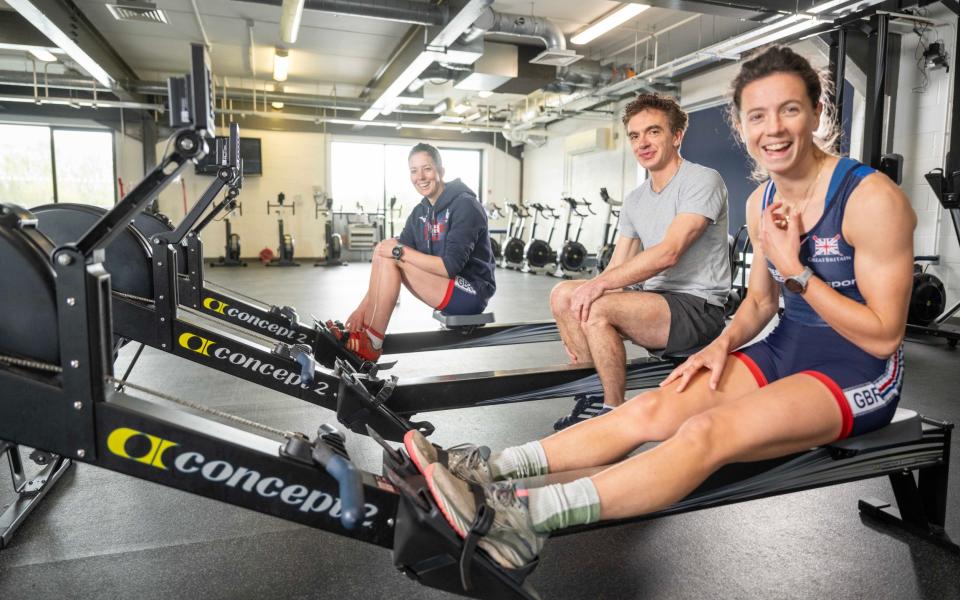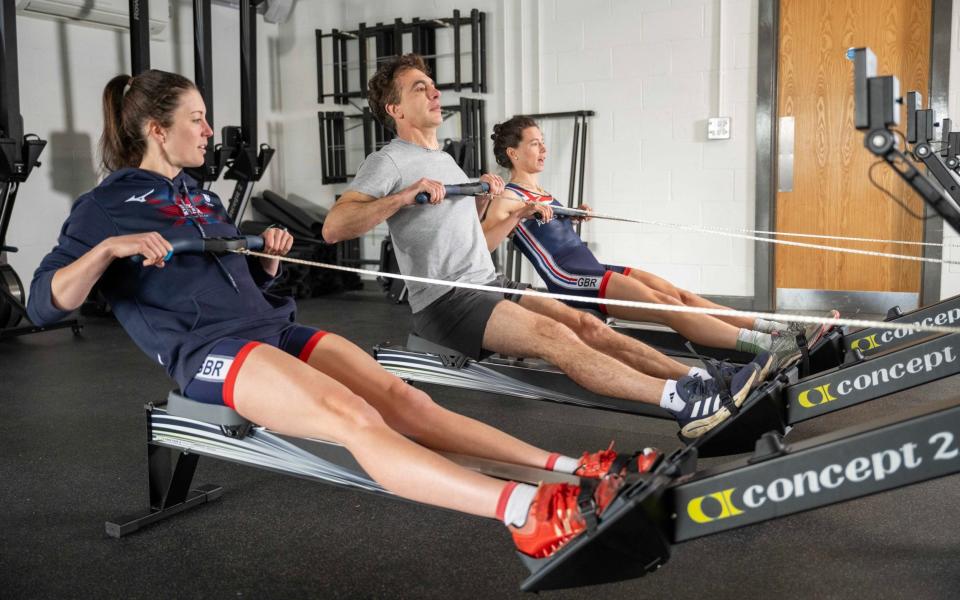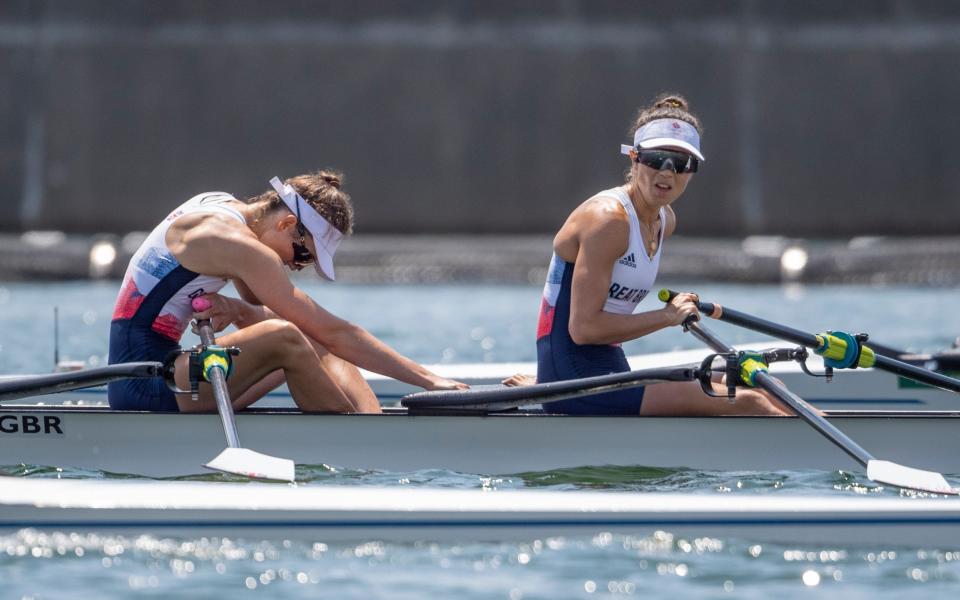We row for GB women – but that does not stop ‘mansplaining’ at the gym

As a junior doctor, Imogen Grant has a high tolerance for the unpalatable. Hospitals are her safe space. But put her in a public gym and her stress levels spike.
The explanation? Mansplaining.
“One of my friends was doing intervals on the ergo [rowing machine],” Grant tells Telegraph Sport, during a break from training at British Rowing’s Caversham headquarters. “Six sets of 500 metres, something like that, with pauses in between. A guy came up to her and said, ‘You’d be able to keep going for longer if you don’t go so hard’.”
Grant and Emily Craig – her partner in the lightweight double sculls – look at each other and chuckle ruefully. Then they start discussing Georgia Ball’s recent viral video. The one in which Ball, a PGA pro from Lancashire, was working on her technique at the range when an unidentified male told her she was swinging too slowly.
“I’ve not had anything as bad as that,” says Craig. “But there have been instances of unsolicited coaching. To which I’m, like, ‘Sorry?’ Sometimes I get, ‘What’s your peak performance?’ But I don’t really know how to answer that.”
Grant’s occasional public training sessions usually involve a 60- or 90-minute workout on the ergo – the snail-shaped instrument of torture you usually find behind the treadmills – and a steady stream of nosy parkers on the next-door machine.
“They’ll sit down, peek over at my split time, and double their speed for a couple of minutes trying to match it. Then they’ll get off and the next guy has a go. That’s why I avoid public gyms like the plague. I much prefer the atmosphere in a rowing club.”
You can see why a hulking gym bro might “peek over” at Grant – 5ft 6in tall, nine stone – and wonder why he cannot keep up. But size can be deceptive on the ergo machine, where technique, training and athleticism all compensate for a lack of heft.
Since the Tokyo Olympics, Britain’s lightweight double have entered eight elite events and come away with eight gold medals. They regularly cover 2000 metres in less than seven minutes.
Looking for a cheap laugh, my editors have nominated me for the mansplainer’s role today, pulling an ergo between Grant and Craig. Not that there is any chance of me coming over all testosterone-y. I am too busy trying not to slip a disc.
“You’re rushing back up the slide too quickly after you’ve finished the stroke,” says Craig, who is clearly used to instructing novices. “Try to reach forward with your arms first, then tilt your back. Only then do you bring your knees up.”
Like those hapless fellows in the gym, I am killing myself trying to keep pace with the world’s best. Even though Grant and Craig are cruising serenely at a split time of around two minutes per 500 metres – some 30 seconds slower than they are capable of – I am puffing and sweating after a few dozen strokes. Fortunately, they let me off after seven minutes or so, at which point I am ready to pass out while they are barely breathing.


If you add it all up, Craig has probably spent the best part of a year on the ergo since her parents, who were both fitness enthusiasts, took her to the British Rowing Indoor Championships in 2004. She had just turned 12 at the time. Now 31, she is probably in her final season as a professional (although a little coy about admitting it).
After their dominant recent results, Craig and Grant will go into this weekend’s World Cup regatta in Varese, northern Italy, as the clear favourites. This is the warm-up for the European Championships in April, which in turn leads into the real focus: the Paris Olympics.
Should Craig ever lack motivation for the next ergo session, she can simply look at her living-room wall. In between the World Championship victory certificates hangs a photograph of the finish line at the Tokyo Olympics. Craig and Grant were well placed entering the final sprint, but ended up fourth by a hundredth of a second, edged out by Italy, France and the Netherlands.

“It was bigger than I thought it was going to be,” says Craig of the image, which she printed out at Snappy Snaps. “We came out of the back of Tokyo and I didn’t know if I wanted to carry on. But we went through a lot in that year, especially with all the Covid stuff. The print is a reminder that, if we can be so close to gold with all of that, then where can we take it when we’ve not got the extra stresses?”
Fourth place became a running theme in Tokyo. Six boats finished in that position, while none were victorious, making this the first Olympic rowing regatta since 1980 to produce no British champions.
It was also the first for decades to go ahead without Jurgen Grobler, arguably the greatest Olympic coach in history. Watching from the sidelines, many observers assumed that British Rowing had gone down the same road as cycling and swimming: a gentler approach from management leading inexorably to diminished results.
While Grant shrugs off this theory, painting Tokyo as a regatta of small margins and near-misses, Craig acknowledges that the new programme – introduced by the understated Australian coach Andrew Randell – has surprised her with its rigour. “If you’d told me, four years ago, about the training volumes we’re doing now, I’d probably have laughed at you. There was one day, soon after Andrew arrived, when I couldn’t get up from the sofa. I had to roll off it instead.”
To add an extra wrinkle to the Olympic run-in, Paris will represent lightweight rowing’s last stand – or possibly sit – at the Games. For Los Angeles in 2028, it will be replaced by the more inclusive discipline of beach sprints, which does not need a rowing lake, and thus finds a following in traditionally under-represented nations such as Tunisia.
“It does mean the stakes are slightly higher,” says Craig, when asked about the bonfire of the lightweights. “You could be Olympic champions forever.”
“It’s kind of bittersweet,” chimes Grant. “We’ve both had really positive experiences as lightweights, and I wouldn’t have started taking rowing seriously if it wasn’t a thing. But there have also been stories about people having really bad experiences with body image and making weight.”
Despite the challenges of competing with much taller women, and the additional commitment of her foundation year at a Slough hospital, Grant still believes that she can maintain a place within the British Rowing set-up.
“I’m sticking around this area because I don’t intend to stop rowing,” she says. “I trained full time doing a medical degree and managed to make it to the World Championships the last couple of years. So I don’t see why I can’t try doing that again with a job.”
Craig prefers to keep her post-Paris plans under wraps, though they sound clearly formed in her head. With a post-graduate degree in Asian art from the Courtauld Institute, for which she learned Japanese, she lives up to rowing’s reputation as a cerebral sport.
“In the art sector, you’re either in or you’re out,” Craig says. “After Tokyo I got a job in an auction house, specialised in coins. I love Asian art, and I would love to get there eventually. But I suspect that there will have to be a couple of detours first.”
As a multilingual high achiever, Craig will probably end up working for Sotheby’s or one of its rivals. Wherever she goes, though, her complex relationship with the ergo will continue.
“It’s an odd one,” she says. “I certainly fell out of love with it for a while. Then I had to reconcile myself with it through lockdown, because there was nothing else to do. Now it’s just kind of there, and will probably remain part of my life forever.”

 Yahoo Sport
Yahoo Sport 



































































